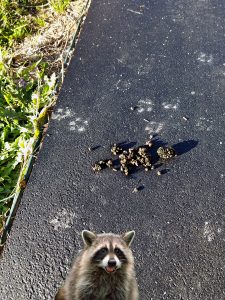I hate to be such a complainer, but the raccoons are really driving me up the wall. The devils have decided that my several hundred yards of walkways and pier are fair game for their scat. Hey, we all have our bodily functions, and I don’t begrudge them a place to go. But why they can’t avail themselves on the rest of my fifty acres is beyond me. No, it has to be where I walk.
When I began this article, I was merely annoyed. Unfortunately, I researched this topic and discovered that raccoon droppings are hazardous to your health!
The Center for Disease Control explains that raccoons defecate in communal sites, called latrines. Apparently, I now live in a latrine. Latrines may be found at or on:
- trees (around the base and at forks)
- raised horizontal surfaces (such as fallen logs, stumps, woodpiles, or large rocks)
- decks or patios
- attics
- garages
According to the CDC, raccoons are the primary host of Baylisascaris procyonis, a roundworm that can be harmful to people. Roundworm eggs are passed in the feces of infected raccoons, and people become infected by ingesting eggs. Anyone who is exposed to environments where raccoons frequent is potentially at risk.
Their guidance continues to recommend cleaning to prevent possible infection. Eggs in newly deposited feces are not infectious and take at least two to four weeks to become infective. Prompt removal and destruction of raccoon feces will reduce risk for exposure and possible infection.
The CDC gives these instructions for outdoor cleaning:
- Feces and material contaminated with raccoon feces should be removed (using a shovel or inverted plastic bag) and burned, buried, or bagged and placed in the trash to be sent to a landfill.
- Most chemicals do not kill roundworm eggs, but heat will kill the eggs instantly. Treat feces-soiled decks, patios, and other surfaces with boiling water or a propane torch.**
- Disinfect hard, smooth surfaces (including shovel blades) with boiling water.
- To help further reduce the risk of possible infection, wash your hands well with soap and warm running water. Clean/launder your clothes thoroughly using hot water and detergent.
**Should I flame the latrine site with a propane torch? Most chemicals do not kill roundworm eggs and are not suitable for outdoor use. Extreme heat will kill eggs instantly. Break up and turn over contaminated soil several times, flaming each time. Flaming with a propane torch is effective, but could cause a fire, burn injury, or surface damage.
Now, I am thoroughly depressed. The new normal in my life will be cleaning everything to protect myself from the coronavirus and roundworms…. I hope the stores haven’t run out of blowtorches yet.


Recent Comments